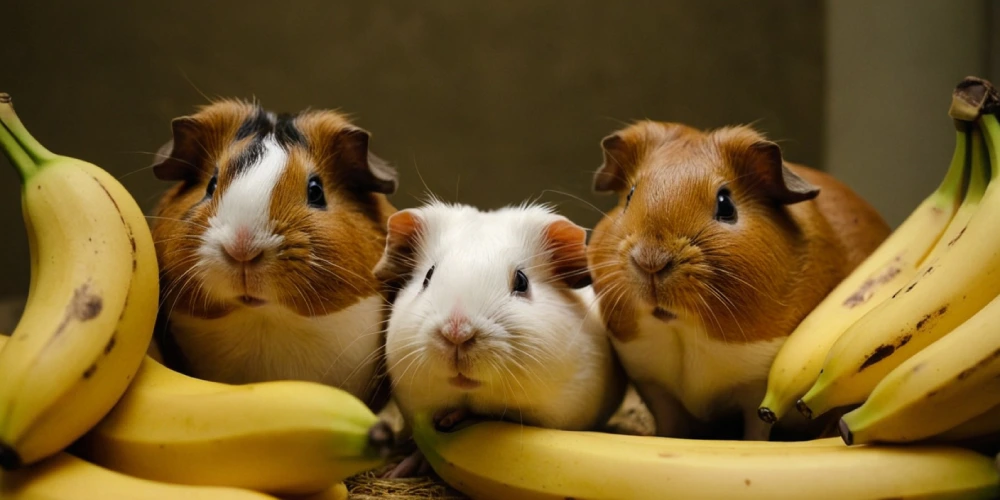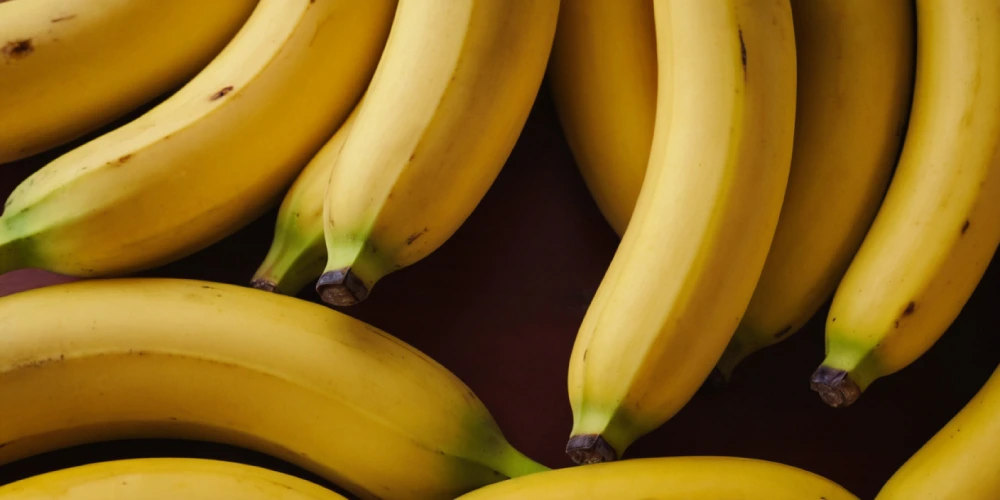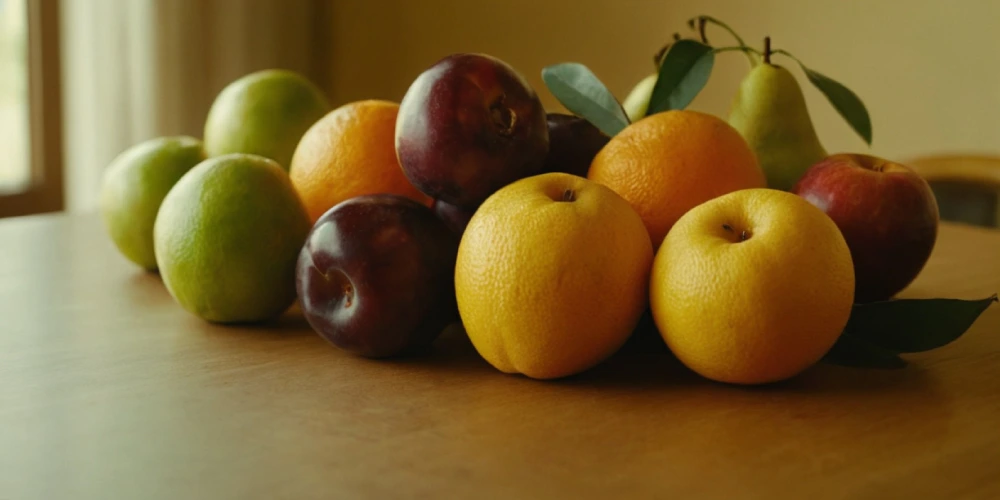
Introduction To Can Guinea Pigs Eat Bananas
Guinea pigs are adorable, gentle creatures that rely on a balanced diet to stay happy and healthy. As a pet owner, you may wonder if bananas, a popular and sweet fruit, can be a safe and nutritious treat for your guinea pig. Bananas contain vitamins and natural sugars, making them a favorite human snack. Guinea pigs have different dietary requirements, though, hence not all fruits are safe for them.
This page will cover whether guinea pigs can eat bananas, the benefits and drawbacks of giving them this fruit, and the proper presentation style. While guinea pigs can enjoy small amounts of fruits as treats, it is essential to understand their limitations. Although bananas are a great source of potassium and other nutrients, if consumed in excess or too frequently, their high sugar level may cause issues.
We will also discuss alternatives to bananas, how often you should offer them, and what signs to watch for if your guinea pig doesn’t tolerate them well. By the end of this guide, you will know precisely how to introduce bananas into your guinea pig’s diet safely.
Can Guinea Pigs Eat Bananas?
Yes, guinea pigs can eat bananas, but only in small amounts. Bananas are not toxic to guinea pigs but can provide some nutritional benefits. However, if consumed excessively, bananas’ high sugar content might have adverse health effects.
Guinea pigs thrive on hay, fresh vegetables, and fortified pellets. Fruits like bananas should only be given as occasional treats. Overfeeding fruits can lead to weight gain, digestive upset, or other problems. When serving sweet delicacies like bananas, always remember that moderation is essential.
Nutritional Value of Bananas
When given in the proper doses, bananas’ abundance of nutrients can help guinea pigs. Here’s what bananas contain:
Potassium:
Potassium supports heart health and muscle function. It is a necessary mineral that helps keep the body’s fluid balance in a healthy range.
Vitamin B6:
This vitamin aids in the body’s energy production and is crucial for brain function. While guinea pigs only need small amounts, bananas provide a natural source.
Fiber:
Bananas contain dietary fiber, which helps support a healthy digestive system. Fiber encourages regular bowel motions and avoids constipation.
Natural Sugars:
The natural sugars in bananas provide a quick source of energy. However, too much sugar is not suitable for guinea pigs and can lead to weight gain or other health issues.
Benefits of Feeding Bananas to Guinea Pigs
When offered in small amounts, bananas can provide several benefits for guinea pigs:
Boosts Energy:
Bananas’ natural sugars might give your guinea pig a rapid energy boost. This can be helpful for active guinea pigs that enjoy running around and exploring.
Promotes Hydration:
Because they contain a lot of water, bananas can help your guinea pig stay hydrated. Maintaining adequate hydration is essential for their general well-being.
Provides Variety:
Adding bananas to your guinea pig’s diet as an occasional treat can introduce variety and keep their meals exciting. This can encourage healthy eating habits.
Source of Nutrients:
Bananas contain vitamins and minerals that contribute to a balanced diet. They can supplement your guinea pig’s nutrition when fed appropriately.

Risks of Feeding Bananas to Guinea Pigs
While bananas can be a healthy treat, there are also risks associated with feeding them to guinea pigs:
High Sugar Content:
Bananas are lovely; too much sugar can lead to obesity, diabetes, or other health problems in guinea pigs. Always limit the portion size.
Digestive Issues:
Feeding too many bananas can cause bloating, diarrhoea, or an upset stomach. The delicate digestive processes of guinea pigs necessitate a strict dietary balance.
Choking Hazard:
Large banana pieces can be difficult for guinea pigs to chew and swallow. Always cut the banana into small, manageable pieces to reduce this risk.
Imbalance in Diet:
Overfeeding bananas can disrupt the balance of nutrients in your guinea pig’s diet. Too much fruit may cause them to eat less hay, which is essential for their health.
How to Safely Feed Bananas to Guinea Pigs
To ensure that bananas are a safe and enjoyable treat for your guinea pig, follow these steps:
Choose a Fresh Banana:
Select a ripe banana that is free from bruises or spots. Avoid overripe bananas, as they contain even more sugar.
Wash Thoroughly:
Even though you won’t feed the peel (unless it’s organic), washing the banana removes dirt and pesticides that may have transferred to the fruit.
Cut into Small Pieces:
Slice the banana into small, bite-sized pieces. A portion size of about half a teaspoon is enough for one guinea pig.
Serve Occasionally:
Limit banana treats to once or twice a week. Avoid feeding bananas on consecutive days to prevent your guinea pig from overloading with sugar.
Monitor Their Reaction:
Watch your guinea pig after feeding them bananas for the first time. If they show signs of discomfort or diarrhea, discontinue feeding bananas.
Can Guinea Pigs Eat Banana Peels?
Yes, guinea pigs can eat banana peels only if they are organic. Non-organic banana peels are often treated with pesticides and chemicals that can harm guinea pigs. Even organic peels should be washed thoroughly to remove dirt.
Banana peels are less sweet than fruit but contain nutrients and fiber. If your guinea pig enjoys the peel, you can offer a small piece as an occasional treat.
How Often Should Guinea Pigs Eat Bananas?
Bananas should only be given as a rare treat. Once or twice a week is more than enough. Too many bananas can upset guinea pigs’ digestive systems or contribute to weight gain.
When feeding bananas, remember that variety is essential in a guinea pig’s diet. Rotate bananas with other safe fruits and vegetables to provide a balanced mix of nutrients.

Alternatives to Bananas for Guinea Pigs
If you’re looking for other safe treats to offer your guinea pig, consider these options:
1.Apples (Without Seeds):
Apples are a crisp and sweet fruit that guinea pigs usually enjoy. Remove the seeds before serving.
2.Blueberries:
These small, juicy fruits are a great occasional treat packed with antioxidants.
3.Strawberries:
Strawberries are another sweet option, but they should only be fed sparingly, like bananas.
4.Bell Peppers:
Vitamin C-rich bell peppers are a great addition to your guinea pig’s diet.
5.Cucumber:
Cucumbers are hydrating and low in sugar, making them a refreshing treat.
Conclusion
Guinea pigs can enjoy bananas as a tasty and nutritious treat, but they should always be in moderation. Although they include essential vitamins and minerals like potassium and vitamin B6, bananas are unsuitable for regular feeding due to their high sugar content.
When offering bananas, cut them into small pieces, serve them occasionally, and watch for any signs of digestive upset. Your guinea pig’s primary diet should consist of hay, fresh vegetables, and pellets, with fruits like bananas reserved as occasional treats.
These rules will help keep your guinea pigs happy and healthy while carefully adding sweetness to their diet.
FAQs
1. Can guinea pigs eat dried bananas?
No, dried bananas are not suitable for guinea pigs. They are much higher in sugar and calories compared to fresh bananas, which can lead to obesity and other health problems.
2. What happens if my guinea pig overeats a banana?
A guinea pig overeating a banana may experience diarrhea, bloating, or weight gain. Monitor its behavior and adjust its diet if needed.
3. Can baby guinea pigs eat bananas?
Bananas are bad food for baby guinea pigs. Their digestive systems are still developing, and high-sugar foods like bananas may cause problems. Stick to hay and appropriate vegetables for young guinea pigs.
4. Are bananas better than other fruits for guinea pigs?
Bananas are not necessarily better or worse than other fruits. However, they are high in sugar, so they should be treated as an occasional snack rather than a regular part of one’s diet.
5. How can I tell if my guinea pig likes bananas?
If your guinea pig likes bananas, it will eagerly eat them and look forward to more. If it shows no interest or leaves the banana untouched, it might not enjoy the fruit.
